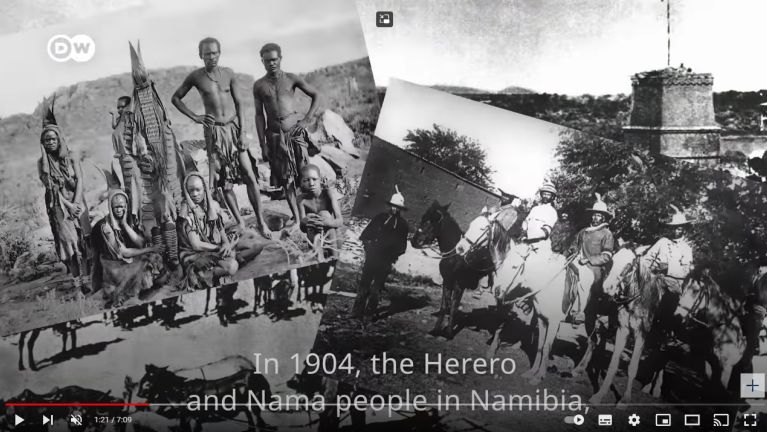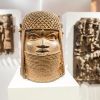“An important sign of rapprochement”
A new DAAD scholarship programme supports research into Germany’s colonial history.

There has not been sufficient critical engagement with Germany’s colonial history in German research to date: much of what happened in the German colonies more than 100 years ago has not been extensively researched. Yet this certainly needs to be done, as the troops of the German Empire occupied what is now Namibia, Cameroon, Togo, Tanzania, parts of Ghana, the city of Qingdao in China and several islands in the Western Pacific and Micronesia until the end of the First World War in 1918 – at times with devastating consequences, as was the case with the Herero and Nama genocide in Namibia in the years 1904 and 1905. The scholarship programme “German Colonial Rule” (GCR), initiated by the German Academic Exchange Service (DAAD) and funded by the Federal Foreign Office with 1.2 million euros, intends to close this gap. By 2026, nine young researchers will have the chance at German universities to do a PhD relating to Germany’s colonial past and its effects.

Rewriting colonial history
One of the scholarship holders is Gloria Unotjari Tjitombo from Namibia, who is doing a PhD at the University of Cologne. “I see the programme as a chance to rewrite Namibia’s history from a Namibian perspective,” she says, adding that it is an opportunity to document the voices of those who were actually affected. She believes it is easier for her as a Namibian to understand the people and their stories. The doctoral student, who graduated with a master’s degree from the University of Namibia, is researching the work regime in her homeland – in the form of a long-term study from the period of German colonial rule to post-independence Namibia. “Work was one of the driving factors of German colonial history in Namibia,” she explains. Gloria Unotjari Tjitombo now wants to study the secrets and complexity of this multifaceted topic in Namibia – thereby contributing a new perspective on the world of work in her capacity as a sociologist, a perspective that she believes has been lacking in the past 20 years.

Broad spectrum of research topics
Overall, the spectrum of research topics pursued by the scholarship holders is broad. They extend from biographies of those who worked in the colonies as directors or state secretaries in the colonial department or in other elevated positions for the German Empire, to studies of the role played by German administrative authorities in the areas of law, trade or the military, and to comparisons of the colonial policies of different countries. Christian Lemuel Magaling did his master’s at the University of the Philippines and is now researching for his PhD at the University of Bonn: “My objective is to explore Germany’s colonial involvement in Southeast Asia and the Pacific during the period of imperial German rule,” he explains. Specifically, he intends to reconstruct the Kaiser’s decision to intervene in the colonial policy of these regions. To this end he is analysing letters, guidelines and scientific studies, as well as the resistance of intellectuals in the native population.
Accepting historic and moral responsibility
DAAD President Prof. Dr. Joybrato Mukherjee believes that the projects pursued by the researchers from the former colonial regions together with colleagues at the German universities are an important sign of global rapprochement. “As such, we at the DAAD are making a contribution to accepting historic and moral responsibility for the suffering caused to people in many countries of Africa and Asia,” he said.
We are determined to push forward with a critical appraisal of Germany’s colonial past.
Katja Keul, Minister of State for International Cultural Policy at the Federal Foreign Office, makes similar arguments. “In our capacity as the Federal Government, we are determined to push forward with a critical appraisal of Germany’s colonial past,” she says, explaining that research plays a prominent part in this. “We still know far too little about the role played by German authorities during the colonial era. It is important to us to study this chapter of our history together with scholars from countries with a colonial history,” she stresses.
Dieses YouTube-Video kann in einem neuen Tab abgespielt werden
YouTube öffnenThird party content
We use YouTube to embed content that may collect data about your activity. Please review the details and accept the service to see this content.
Open consent formInternational exchange
The Filipino doctoral student Christian Lemuel Magaling is happy meanwhile that the scholarship is widening the scope of his research, giving him access for example to archives and libraries in Germany. His stay at the University of Bonn is also helping him forge new contacts and expand his network. “It is unusual for us scholars to be able to compare colonial research in different regions of the world because each colonial regime has its own way of dealing with, controlling and suppressing resistance,” he explains, adding that it is rarely possible under normal circumstances for him to be able to discuss this with colleagues from Africa. The DAAD scholarship is enabling him to engage in this exchange over the coming years.



